
Stuart Gordon died today at the age of 72. He leaves behind a wife and three daughters. I wrote the following in remembrance of the man who somehow gave us both Re-Animator and Honey, I Shrunk the Kids. It is in some areas an updated, re-written version of a Gordon deep dive I published two years ago.
In 1996, the film magazine Cinefantastique named Stuart Gordon one of the 50 most powerful people in science fiction, recognizing his contribution to genre cinema as not just the man who made Re-Animator but also films like From Beyond, The Pit and the Pendulum, Dolls, and Castle Freak. It was an especially unlikely honor: Just over a decade earlier, Gordon had never written or directed a movie before.
"If it can be done on film, it can be done onstage, only better."
The first act of Stuart's career was as a writer and artistic director of transgressive theater in the Chicago area. In 1968, the mayor of the city gave cops permission to bust the heads of anti-war demonstrators outside the Democratic National Convention. A counterculture kid through and through, Gordon took all of that in and funneled his outrage into a college production of Peter Pan which turned the lost boys into hippies, Wendy and the others into suburban kids, the pirates into cops, and flying into tripping on drugs. "Without changing one word of dialogue, we made a political cartoon out of J.M. Barrie's play," he later told Rolling Stone.
The authorities were not amused and particularly objected to the Never Neverland fairies appearing nude on stage. After just the second performance, Gordon and his wife Carolyn - who played one of the fairies - were arrested for obscenity. The charges didn't stick, but the reputation sure did. Gordon flew out of the gates with an appetite for outrage.
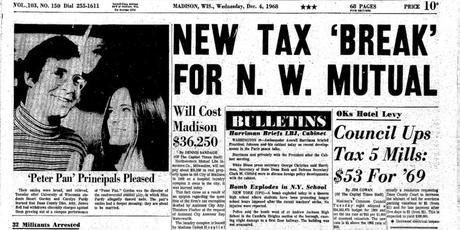 Gordon and his wife Carolyn in a newspaper article about the obscenity charges being dropped.
Gordon and his wife Carolyn in a newspaper article about the obscenity charges being dropped. Moving on from college, Gordon found an old church that let him tear out all of the pews. There, he established his own theater company - the Organic Theater, which one of his friends called "the take-off-your-clothes, scream and bleed theater." For the next 16 years, the Organic staged 37 different original or adapted plays, ranging across the board from sci-fi epics to musicals and book adaptations. People like John Heard, Joe Mantegna, and Dennis Franz got their start there.
On his philosophy toward running the Organic Theater, Gordon shared: "You have to grab people. Roosevelt said the first job of a president is to get elected. The first job of a producer is to get an audience."
What an audience. When Gordon was done with the place, it had an annual budget of a million dollars and steady ticket sales, according to .
William J. Norris - an Organic actor who later co-wrote Re-Animator with Gordon - said, "Stuart's big line was 'If it can be done on film, it can be done onstage, only better.' And all the bruised bodies and broken bones were a testament to the fact that sometimes you can do it and sometimes you can't."
"I've just written my first visual pun!"
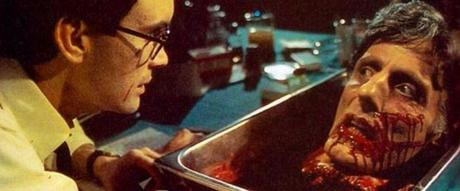
That kind of notoriety eventually floated Gordon's name to Los Angeles, where producer Brian Yuzna was desperately searching for a director. A Philippines native who had only just recently moved to LA from North Carolina, Yuzna wanted to make a movie about "a guy on death row who gets electrocuted and reincarnated as a potato," as he admitted in an interview for Adrian Roe's 2013 book First Scream to the Last.
 No, don't eat me!
No, don't eat me! Gordon had different ideas, most specifically a TV series based on the H.P. Lovecraft short story collection Herbert West, Re-Animator. With help from Norris and Dennis Paoli, Gordon had already developed scripts for a pilot and 12 additional episodes, detailing one arrogant medical student's ill-fated experiments with bringing back the dead. After Gordon and Yuzna met in Chicago, they split the difference, dropping the potato and TV ideas in favor of turning Re-Animator into a movie.
A year later, they were on set with Jeffrey Combs (as West), Bruce Abbott (as the more straight-laced medical student Dan Cain), Barbara Crampton (as Dan's girlfriend), and David Gale (as the dean who tries to steal West's research), all of the money coming from Yuzna's personal savings and various investors. Across a hectic 16-day shoot, they spilled 30 gallons of fake blood, created entirely new special effects as they went, and placed Barbara Crampton at the center of one of the most notorious scenes in horror history: Gale's somehow-still-functioning zombie body lowers his severed head onto Crampton's naked body and attempts to give her head.
("I've just written my first visual pun!" cried Paoli on the phone to Gordon when he finished that part of the script.)
As Crampton told Rolling Stone "Stuart approached it like any other scene. He just said, 'He's gonna pick up the head, and it's gonna lick your ear and lick your breasts and then make its way down between your legs, and then Jeffrey [Combs] is gonna come in.' And I said, 'Oh, c'mon, Stuart, are you kidding?' And he said, 'No, seriously, it's gonna be great, really.' He was totally serious. There's something a little off about Stuart. But that offness is part of his genius."
Something off indeed. "There is a side of me that likes to break through clichés and wake people up," Gordon said. "I find that fun. I think that's part of what art is supposed to do - to make you see or experience things in ways that you haven't before."
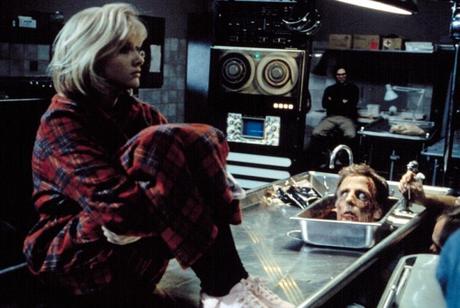 Crampton keeping warm in-between takes.
Crampton keeping warm in-between takes. The MPAA would have definitely had something to say about that if given the chance, but instead of inviting the headache of a never-ending back-and-forth with the censors Yuzna chose not to submit Re-Animator to the MPAA at all. The distributor - Empire Pictures - released it in theaters unrated, which is usually the part where you give up on ever making any money off the movie. Unrated pictures simply face too many bureaucratic - newspapers won't run ads, certain theaters won't exhibit the movie - barriers to profitability.
However, unleash that kind of movie into the booming VHS era of 1985 and you have the perfect recipe for a cult classic, one which did so well on home video that Yuzna had to sue Empire for the profits. By the time the lawsuit concluded, Empire was already out of business, with its chief proprietor Charles Band moving on to a different company. Gordon's Re-Animator follow-ups - the 1986 Lovecraft adaptation From Beyond and 1987's campy tourist trap flick Dolls, both distributed by Empire - had come and gone, barely making a box office dent. Like Re-Animator, they would find their audience through home video, but for genre fans Gordon's opening trio of films clearly announced him as a promising new voice.
So, clearly, he'll work with Disney next, right?
"Dad, are all of these dolls bad?"
When Gordon made Re-Animator, he already had two young daughters at home. His wife Carolyn - who has a small part in the film as Bruce Abbott's hospital supervisor - actually had to fly back home to Chicago to take care of the kids.
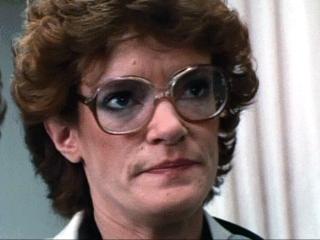 Purdy-Gordon. She also has roles in her husband's films From Beyond, Dolls, Robot Jax, The Pit and Pendulum and Space Truckers.
Purdy-Gordon. She also has roles in her husband's films From Beyond, Dolls, Robot Jax, The Pit and Pendulum and Space Truckers. Two years later, when Gordon traveled to Europe to make Dolls (as well as From Beyond) one of his daughters visited the set, saw a room full of dolls, and thought, "Which one of these can I take home with me?" If you've seen the movie, of course, you know - spoiler - the dolls are actually miniaturized versions of tourists who were unlucky enough to happen upon a demented, but clearly magical old couple's countryside home. On set, though, they were just props, indistinguishable from any other doll a little kid might play with, and Gordon's daughter had her eye on the one with white buttons.
"Dad, are all of these dolls bad?" she asked. When he confirmed her suspicion, she hopefully offered, "Even this one here, with the white buttons?"
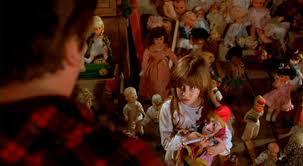
It wasn't. Obviously. Gordon couldn't deny his daughter this one indulgence. She held on to it for years. The film managed just fine without it.The experience stuck with him, though. When your daughter asks about a cute doll on your film set, should she really have to ask, "Is that one evil?" So, when Gordon's family subsequently grew from two daughters to three, he pursued work at Disney.
"Dad, how come we never get to see any of your movies?"
As Gordon told Maitland McDonagh in Filmmaking on the Fringe: The Good, The Bad, and the Deviant Directors, his march toward family movie gold began in Brian Yuzna's backyard. At that point, Yuzna lived next door to Jeremy Kagan, a director who had just made The Journey of Natty Gann for Disney. Their kids went to school together, and the Kagans invited their entire class to a free advance screening of Natty Gann Yuzna's kids got to.
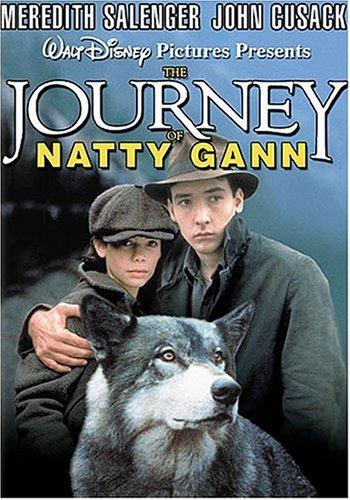 Logline: In the 1930s, a tomboyish girl runs away from her guardian to join her single father who is 2,000 miles away, because there was work there.
Logline: In the 1930s, a tomboyish girl runs away from her guardian to join her single father who is 2,000 miles away, because there was work there. "Brian's kids came home afterward and said, 'Dad, how come we never get to see any of your movies,' which knocked his nose a little out of joint, Gordon recalled. "His movies weren't the kind of thing you'd invite a whole class full of other people's children to, and that was what got to Brian."
It's worth pausing to remember that in addition to producing Re-Animator, From Beyond, and Dolls, Yuzna also eventually expanded into directing, manning the camera for the seriously twisted 1989 satire Society, a film which ends with a Lovecraftian orgy called "shunting." Try explaining that on the field trip to the movie theater.

"So we started talking about it, saying, 'Why don't we come up with an idea for a movie our kids could see?,' Gordon continued. "And we started talking about little kids playing in the backyard, because that's where we were having this discussion. And all of a sudden this idea kind of came together, about kids who get shrunk so they're teeny-tiny and the adventures they have trying to get across the yard, and we brought it over to Disney."
They would call it: Teeny Weenies
"Clearly we need to find a new title"
Teeny Weenies obviously didn't stick as the title, but that was hardly the shakiest part of the proposition. Disney had fallen on lean times by then, with constant in-fighting between Michael Eisner and Roy E. Disney over the future of the company. If Eisner had his way, there would be no more animated films and fewer family friend films altogether. Roy insisted on maintaining the Disney family friendly brand. Into that mess walked the guys who made Re-Animator, ready to pitch an idea about a scientist who accidentally shrinks his kids.
Dolls screenwriter Ed Naha's was recruited to convert their idea into a script, and his original treatment was 70 pages long; Disney, which was first turned onto the project through a junior executive named David Hoberman, offered back over 100 pages worth of notes. Several months and countless rewrites passed before the trio were finally invited in to meet Jeffrey Katzenberg, who had been marking up their scripts with rather blunt criticisms.
Gordon recounted this first meeting in a 2016 Talk House column: "'Welcome to the first production meeting for Teenie Weenies,' Katzenberg began. Brian Yuzna and I looked at each other. Were we actually in production? 'Clearly we need to find a new title,' he continued."
Katzenberg immediately cut to the heart of he problem, tossing out the following joke: " Teenie Weenies - is the title autobiographical?" Gordon offered an alt-title option - The Itsy-Bitsies - which was similarly rejected. Somebody in the marketing department actually came up with Honey, I Shrunk the Kids, which was as perfect a Katzenberg title as you could find.
Again, Gordon looking back on it in 2016: "Jeffrey likes titles that tell the audience what the movie is about. Not everyone liked the new title (including me) and I remember one producer reminding Jeffrey that Rain Man wasn't called My Retarded Brother. But of course he was proven right about Honey, as the title has become a part of our national vernacular and the set up to a million jokes."
"The movie was going to happen, and I was going to direct it."
Settling on the right title was but the first of countless battles. Breakfast meetings were scheduled for 7AM at the start of production; by the end, those meetings started at 5 AM thanks to Katzenberg's pledge to not waste a single minute every day. Anyone who complained about working on Saturdays was simply told not to worry about coming on Sunday either because they were fired. Katzenberg's notes on the script were often insane, like demanding the shrunken kids encounter a pile of dog shit in the back yard the size of the Beverly Center.
But they were also sometimes helpful. For example, his suggestion to have the kids trapped in a shopping cart which is being bombarded with grocery items - as a means for budget-ligthening production placement opportunities - directly inspired Gordon to create the film's most iconic scene:
But the gruelling schedule and constant back-and-forth took its toll on Gordon:
The movie was going to happen, and I was going to direct it. We went into pre-production and planned it all out, and worked with the designers, found a director of photography, got all the effects people on board. And about two weeks before we were going to start shooting, I got sick and had to drop out.
By "got sick" he means he suffered a rather horrific-sounding nosebleed during a production meeting. A doctor told him the bleed was caused by a combination of stress, Katzenberg's iron-fisted leadership style finally getting to him, and high blood pressure. The movie Gordon only ever wanted to make to give his daughters something they could watch was going to kill him. Literally. The doctor actually used the phrase "you'll die if you make this movie."
That turned the decision into a no-brainer: Gordon had to back away and get healthy rather than risk leaving his kids without a father. "I was replaced by Joe Johnston, who pretty much inherited all this work I had done," he recalled. "And I'm glad he was very faithful to our concepts; there were a few departures, but for the most part it was really our movie. And then the movie did extremely well."
Honey's success launched Johnston - who started his career in visual effects at LucasFilm - into a decade of family-friendly entertainment like The Rocketeer (1991), Jumanji (1995), and October Sky (1999). Now, he's most known for directing Captain America: The First Avenger. Gordon's post- Honey, I Shrunk the Kids output looked an awful lot like what he had done before, with plenty of horror movies ( The Pit and the Pendulum) and other genre pictures, like sci-fi ( Space Truckers) and even film noir ( King of the Ants). For a kid who grew up loving horror movies even though is mother wouldn't let him go to any, there's no shame in that kind of career.
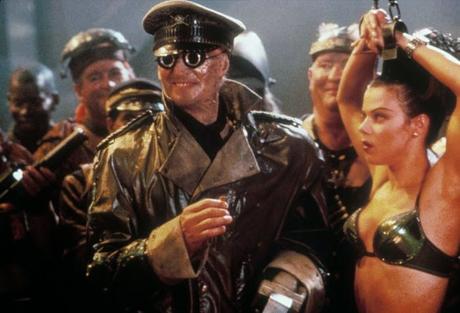 Charles Dance and Debi Mazar in Space Truckers
Charles Dance and Debi Mazar in Space Truckers Still, what happened with Honey was a bit of a bitter pill: "In a way the incident was a good thing, because it made me deal with my health. But i'd be lying if I denied that it was also a huge disappointment, especially when Honey, I Shrunk the Kids became this blockbuster. Still, ultimately, I can't complain; it's done great things for me."
Gordon's reward was an office on the Disney lot, fulfilling a childhood dream, "Walt Disney himself always used to say that they didn't make kids' movies, they made family films. That was a big production in his mind: that Disney made movies that had things in them that everyone could enjoy together, the whole family. So he didn't want the movies just to be kiddie pablum."
Gordon's deal with Disney proved fruitless (various projects worked on went unproduced), but he kept working into his 60s, last directing an episode of Mick Garris' 2008 anthology series Fear Itself. He had been an announced member of last year's Re-Animator reunion at Texas Frightmare but had to cancel at the last minute. Now he's gone.
"We do need positive statements"
Back in 1996, when Cinefantastique profiled him as one of the most powerful presences in sci-fi and horror, Gordon sounded rather wistful about what this kind of storytelling is all about:
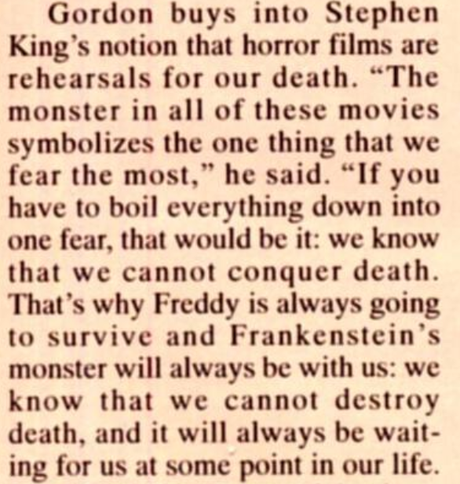
But, he added optimistically, "We do need positive statements; we do need to say to people that you can make a difference - just that the problems are still going to be there waiting for you. We live in a society which is trying to make us feel less and less important and more and more impotent, that we don't matter. People have to find ways to express themselves, and to express these darker images in a horror movie is the ideal way to do that."
And if you can get a little head along the way...
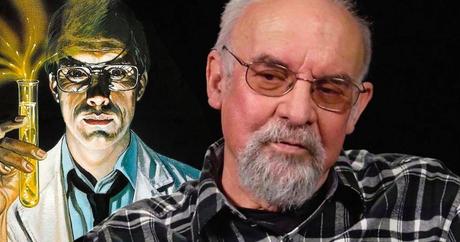
RIP, Stuart Gordon
Source: Rolling Stone, Filmmaking on the Fringe, Adrian Roe's 2013 book First Scream to the Last, Stuart Gordon's 2016 TalkHouse Column "My Adventures with Jeffrey Katzenberg"

